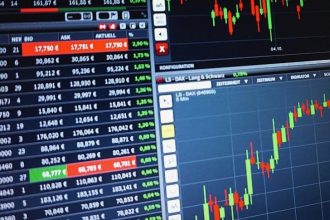In an era defined by unprecedented technological advancement and an insatiable global appetite for financial innovation, the foreign exchange market stands as a colossal, dynamic arena, offering an unparalleled opportunity for individuals to engage directly with the world’s most liquid asset class. Far from being an exclusive domain for institutional giants, the forex market is increasingly accessible, empowering everyday individuals with the tools and knowledge to potentially cultivate significant financial growth. This isn’t merely about exchanging currencies; it’s about understanding global economics, mastering strategic thinking, and harnessing the power of information in real time. The journey into forex trading, while demanding diligence and discipline, promises a fascinating exploration into the intricate dance of international finance, a journey that could profoundly redefine your financial future.
For those contemplating their initial foray into this exhilarating world, the prospect can seem daunting, akin to navigating a vast ocean without a compass. Yet, with the right guidance, a structured approach, and an unwavering commitment to continuous learning, the path to becoming a proficient forex trader becomes remarkably clear and profoundly rewarding. Imagine a market that operates 24 hours a day, five days a week, where trillions of dollars are exchanged daily, reflecting the ever-shifting economic tides across continents. By understanding its fundamental mechanics and diligently preparing, you are not just participating in a market; you are plugging into the very heartbeat of the global economy, gaining a unique perspective and an incredible avenue for personal financial empowerment.
| Aspect of Forex Trading | Description | Reference Link |
|---|---|---|
| What is Forex Trading? | Forex (Foreign Exchange) is the global market for exchanging national currencies. It is the largest and most liquid financial market in the world, with daily trading volumes exceeding $7 trillion. | Investopedia: Forex Trading |
| Key Participants | Includes central banks, commercial banks, institutional investors, hedge funds, corporations, and individual retail traders. Each plays a vital role in market liquidity and price discovery. | BabyPips: Who Trades Forex? |
| Market Hours | Operates 24 hours a day, five days a week, from Sunday evening EST to Friday afternoon EST, spanning major financial centers like Sydney, Tokyo, London, and New York. | Forex.com: Market Hours |
| Main Benefits | High liquidity, low transaction costs, 24/5 market access, potential for high returns through leverage, and diverse trading opportunities across various currency pairs. | Investopedia: Benefits of Forex Trading |
| Risks Involved | Significant risks due to leverage, market volatility, and the complexity of economic factors influencing currency values. Potential for substantial losses if not managed properly. | Investopedia: Risks of Forex Trading |
| Regulatory Bodies | Governed by various national regulatory authorities (e.g., NFA/CFTC in the US, FCA in the UK, ASIC in Australia) to ensure fair and transparent practices. |
The Foundational Pillars: Education and Broker Selection
Embarking on your forex trading journey necessitates a robust educational foundation. This isn’t a venture where shortcuts yield success; rather, it demands a disciplined approach to learning its unique lexicon, analytical methods, and risk management principles. Aspiring traders should immerse themselves in understanding currency pairs, pips, leverage, margin, and the myriad of technical and fundamental analysis tools available. Thankfully, an abundance of high-quality resources exists, from online courses and detailed e-books to interactive webinars and reputable financial news outlets. By diligently studying market trends and integrating insights from sophisticated analytical tools, aspiring traders can significantly enhance their decision-making process, thereby navigating the inherent volatility with greater confidence and strategic foresight.
Once armed with foundational knowledge, the next critical step involves selecting a reputable forex broker. This choice is paramount, as your broker acts as your gateway to the global market, facilitating all your trades. Key considerations include regulatory compliance – ensuring the broker is licensed and supervised by a recognized authority like the FCA in the UK or the NFA in the US – competitive spreads and commissions, the quality and stability of their trading platform (such as MetaTrader 4 or 5), and the responsiveness of their customer support. A reliable broker provides not just access but also essential tools, educational materials, and a secure environment for your capital. Carefully vetting potential brokers is an investment in your future trading success, protecting you from potential pitfalls and ensuring a smooth operational experience.
Mastering the Market: Strategy, Risk, and Continuous Learning
With a broker chosen and an initial understanding forged, the practical phase of your journey truly begins. Most reputable brokers offer a demo account, a remarkably effective tool for practicing your trading strategies with virtual funds in a real-time market environment. This invaluable sandbox allows you to experiment, make mistakes without financial repercussions, and refine your approach before committing actual capital. Think of it as a flight simulator for pilots; it’s where expertise is honed, and confidence is built. This preparatory stage is often overlooked by eager newcomers, but market veterans consistently emphasize its crucial role in developing the discipline and intuition required for successful live trading.
Transitioning to a live account requires not only a well-defined trading strategy but also an unyielding commitment to risk management. Trading without a clear strategy is akin to sailing without a destination, susceptible to every current and storm. Your strategy should encompass your entry and exit points, position sizing, and stop-loss levels, acting as your personalized roadmap. Furthermore, understanding and implementing stringent risk management protocols – never risking more than a small percentage of your capital on any single trade, for instance – is incredibly vital. The market will always present unexpected movements, but a robust risk management plan acts as your financial safety net, preserving your capital for future opportunities. The forex market, with its inherent complexities and dynamic nature, demands persistent learning. The most successful traders are those who continuously adapt, embracing new information, refining their strategies, and maintaining a humble, analytical perspective towards their own performance. By integrating insights from AI-driven analytics and staying abreast of geopolitical developments, traders can further sharpen their edge, transforming challenges into compelling opportunities.
A Future Forged in Foresight and Diligence
Joining the ranks of forex traders is more than simply opening an account; it’s an ambitious endeavor that promises intellectual stimulation, financial growth, and a profound understanding of global economic forces. The path is undeniably challenging, requiring patience, resilience, and an unwavering commitment to self-improvement. However, for those willing to invest the time and effort, the rewards can be substantial, transcending mere monetary gains to include enhanced critical thinking skills and a deep sense of financial autonomy. As the global financial landscape continues its rapid evolution, driven by innovation and interconnectedness, the opportunities within forex trading are only expanding. Embrace this journey with optimism, diligence, and a forward-looking perspective, and you might just discover a powerful new dimension to your financial future.






